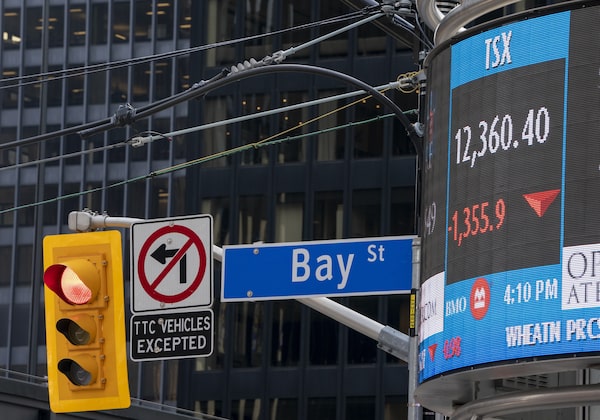
A sign board displays the TSX at close, in Toronto on March 16, 2020. The Canadian Securities Administrators is proposing to modify the industry’s complaint handling process.Frank Gunn/The Canadian Press
Canada’s securities regulators want to design a binding dispute resolution process that would require investment firms to pay monetary compensation if it is determined they committed wrongdoing against retail investors.
The Canadian Securities Administrators – the umbrella organization of Canada’s provincial and territorial securities commissions – is proposing to modify the industry’s complaint handling process to require all Canadian investment firms to comply with any final decision made by a “designated ombudservice.”
It is anticipated that the Ombudsman for Banking Services and Investments (OBSI) will continue to be the designated adjudicator recognized by regulators, but with new binding authority. OBSI is currently able to resolve disputes between an investment firm and an investor, but it can only make settlement recommendations.
“You can imagine that the retail investor, when they have a complaint with their financial institution, seeks a resolution of that complaint,” CSA chair Stan Magidson said in an interview. “But the fact that the financial institution has the ability to resist, then there’s no clear end to the process for the retail investor. And it puts the retail investor at a great disadvantage just because of the power imbalance and the resources that each have.”
Mr. Magidson, who is also chair and chief executive officer of the Alberta Securities Commission, said the proposal is an important initiative that will allow Canada to “catch up with other major jurisdictions,” such as Australia and Britain, that already have “effective and efficient investor complaint, dispute resolution services.”
“Making OBSI recommendations binding could improve investor protection and promote increased fairness for retail clients,” Mr. Magidson added.
The proposal will incorporate OBSI’s existing investigation recommendation processes and add a subsequent optional review stage, which would reach a final decision that binds firms and investors.
Securities regulators ramp up use of investor alerts to flag concerns
While most retail investors’ complaints are resolved by firms, the CSA said it has observed refusals by firms to pay complaints, and patterns of settling disputes for less than OBSI recommends. Both outcomes can have significant effects on complainants, the CSA said, and may discourage other investors from taking their cases to OBSI.
The CSA said firms are most likely to comply with recommendations when payouts are below $50,000. But when OBSI has recommended payouts over $50,000, the CSA said investors received an average of $59,373 less than the recommended amount between 2018 and 2022.
In cases where OBSI recommended payouts of $200,000 to $350,000, 67 per cent of investors had to settle for less.
“This observed pattern can be problematic, given that complainants who have received a greater monetary compensation recommendation are likely to be those who have suffered greater harm,” the CSA said in its proposal.
Currently, when OBSI investigates a complaint and determines that it would be fair for a firm to provide monetary compensation to an investor, it typically attempts to negotiate a settlement with the firm first. If the parties do not agree on a settlement, OBSI issues a non-binding recommendation, up to a limit of $350,000.
Since firms are currently not required to comply with OBSI recommendations, OBSI tries to encourage compliance through a “name and shame” system by posting the firms’ names on its website when they don’t pay any of the recommended amount. However, names are not published when firms settle with investors for lower amounts.
“It’s our observation that name and shame as the sole kind of approach to improving process is inadequate,” Mr. Magidson said. “And this binding authority piece is the missing link, which we now believe it’s timely to implement in the country.”
Mr. Magidson said the CSA has been looking at the proposed binding authority since 2014.
“This precedes my term, but part of the reason this took so long is that we actually wanted to assess OBSI’s performance over time,” he added. “We also took the time to look at what other countries were doing in this context and to get our own inputs on how we measured up internationally. … And we do have the confidence that OBSI are a good ombudsman to endorse.”
The CSA is seeking public comment on the proposal by Feb. 28, and is asking for feedback on other questions, including whether it should increase the OBSI compensation maximum to more than $350,000 and whether parties should have the right to appeal decisions to the courts.